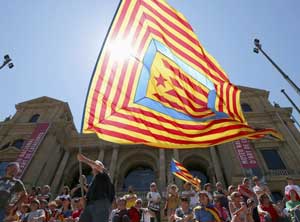30Fa uns dies apareixia un article fonamental al New York Times sobre el Procés i ara la revista més important del món dedicada a la intel·ligència i manual de capçalera dels serveis d’intel·ligència i diplomàcia d’arreu del món, Jane’s intelligence weekly, en publica un altre de vuit pàgines en el que també l’analitza.
A continuació en reproduïm la introducció accessible a la seva web:
Catalonia’s unilateral declaration of independence referendum to escalate political conflict with Spain’s central government in coming months
Key Points
- The unilateral announcement of a definitive date for a new independence referendum represents an escalation of Catalonia’s long-running secession efforts. So far, only a verbal statement of intent has been issued, with formal Catalan government confirmation expected in early September.
- The proposed ballot will face multiple political and legal challenges from Madrid’s central government before its scheduled date in October, although it appears that the national government is awaiting signed ratification of the plan by the Catalan administration before taking action.
- Political pressure within Catalonia to hold the referendum despite its unconstitutional nature will escalate political risks in the region, as well as tensions with the central government in the coming months.
EVENT
The regional government in the autonomous community of Catalonia has revived efforts to seek independence from the rest of Spain and has set a date of 1 October for a popular vote on the subject.

A pro-independence rally in Barcelona, Spain, 11 June 2017. (PA)
Under continued pressure from civil society groups, as well as from within the ruling coalition and allies from the radical Popular Unity Candidacy party (Candidatura d’Unitat Popular: CUP), regional government president Carles Puigdemont has announced that Catalonia intends unilaterally to hold a popular vote on 1 October in which local residents will be asked: “Do you want Catalonia to be an independent state, in the form of a republic?”.
In calling the ballot, Puigdemont has veered away from a softer strategy, previously employed in the region, of holding new regional elections in Catalonia and presenting these as referenda, of sorts, on independence. However, he has also avoided formally ratifying the planned consultation, in contrast to the 2014 non-binding vote on the same issue, for which then-president Artur Mas gave immediate signed confirmation.
Opposition from Madrid…
The revived efforts for a new independence vote in Catalonia started in October 2016 when the regional government approved a resolution to hold what it described as a binding referendum on the issue.
Want to read more? For analysis on this article and access to all our insight content, please enquire about our subscription options: ihs.com/contact



